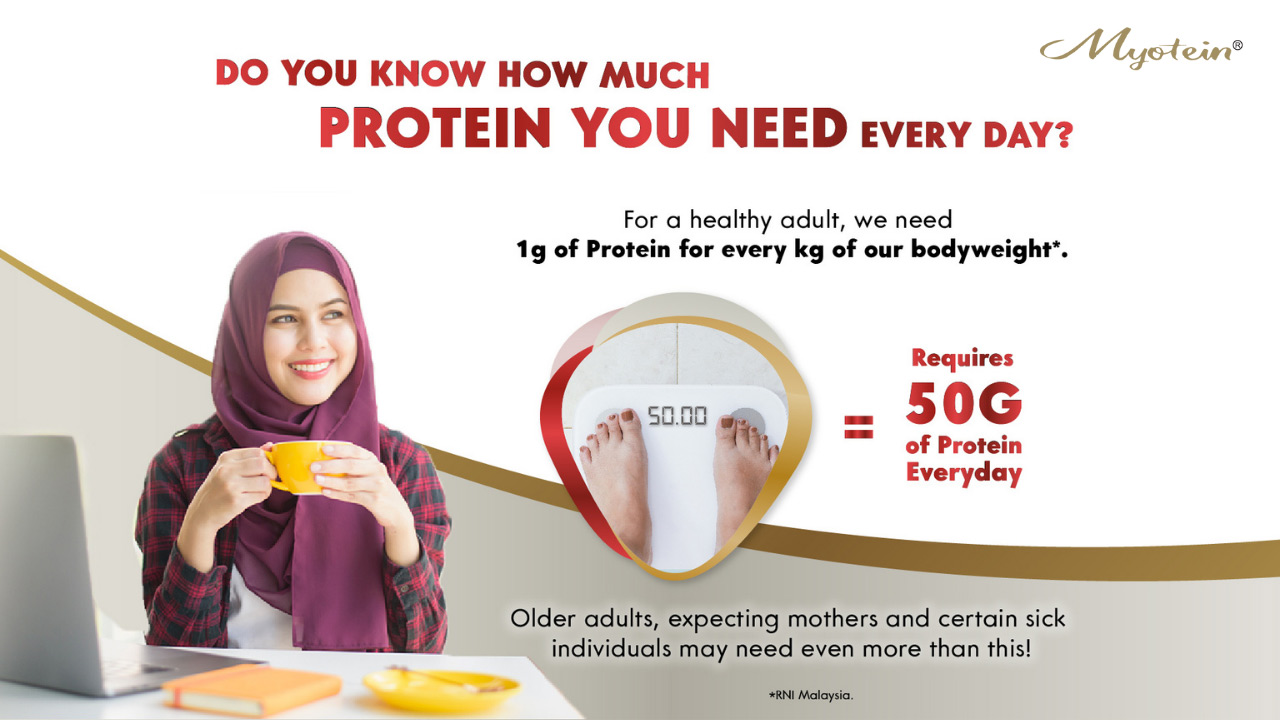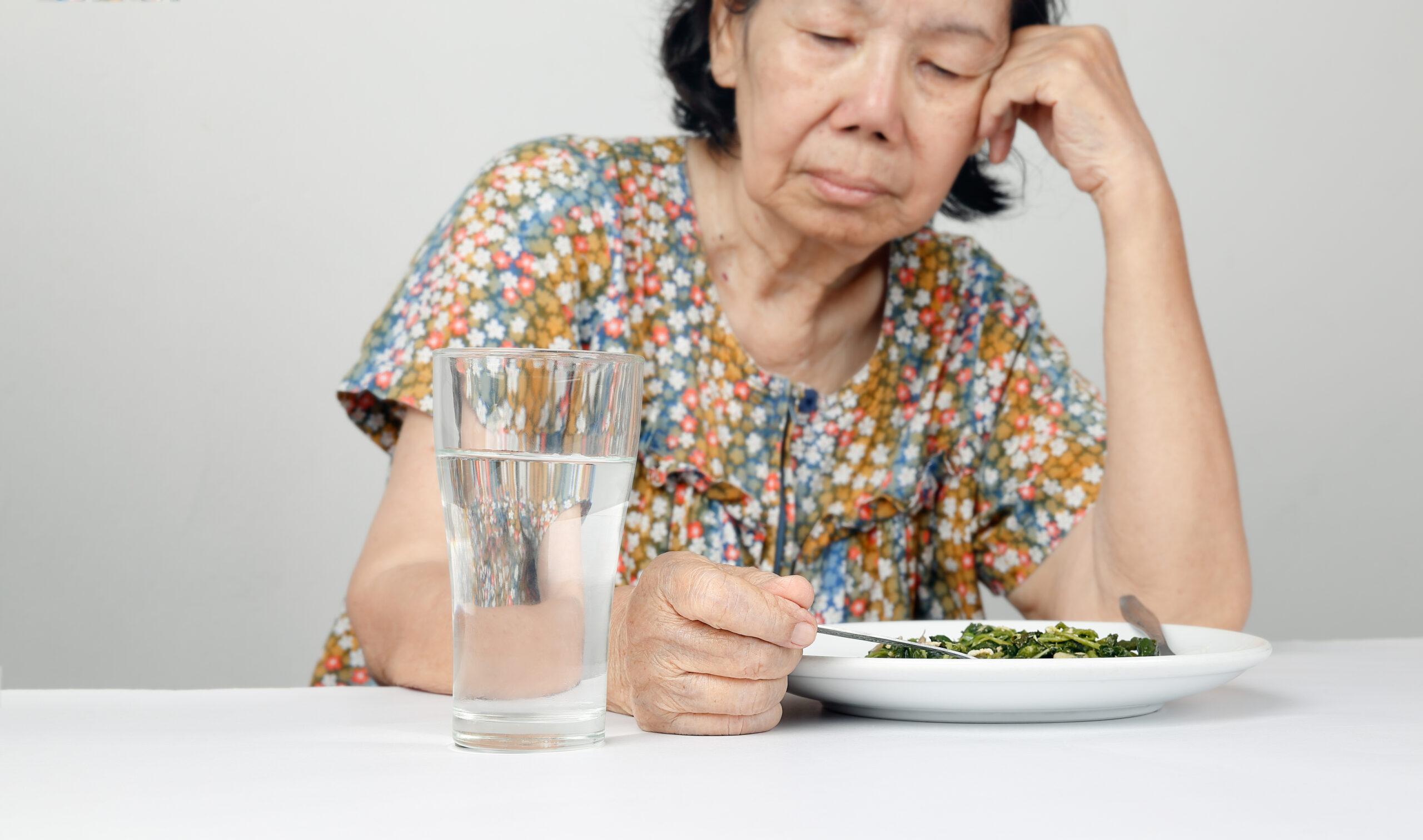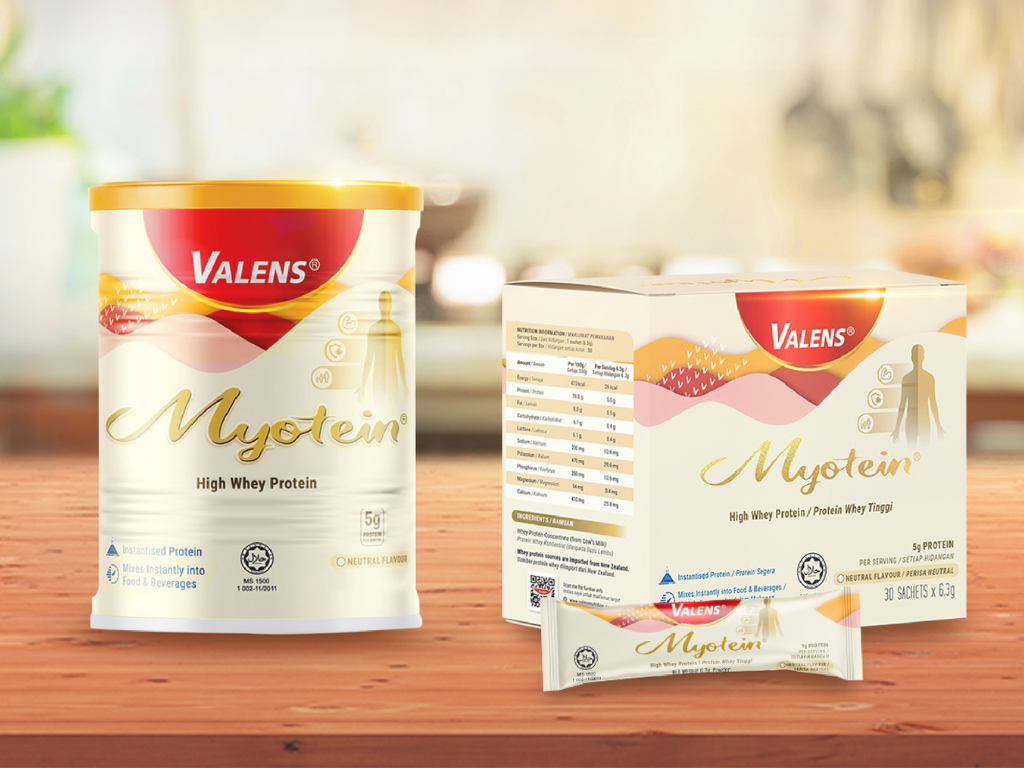As we age, protein can be one of the most important nutrients we cannot miss but often taken for granted. This is because when it comes to protein, many would usually relate it first with bodybuilding, fitness and workouts, rather relating it first as an important nutrient we need like Vitamin C or Calcium.
But when it comes to aging, especially when you are 50 and above, protein is an important daily nutrient to be taken sufficiently, in order to maintain a certain quality of life. This is because, by consuming enough protein in your diet, you will be able to slow down the progress of Sarcopenia, an involuntary loss of skeletal muscle mass and strength due to aging (1).
Muscle mass and strength are very important to upkeep our everyday activities and chores. For example, an activity as simple as walking, uses about 200 muscles for each step we take. While it does not always pose an immediate or apparent problem at first, losing muscle mass and strength gradually as we age may increase the risk of falls, bone fractures and eventually immobility, which would greatly affect our quality of life.
Aside from its prominent role in building and maintaining muscle mass and strength, protein is also crucial for many of our bodily functions. Commonly known as the “Building Blocks of Life” for healing and recovery, protein’s amino acids are constantly required to renew and repair our body cells and tissues, regulate various metabolic functions in our body, as well as supporting our immune system by creating white blood cells, antibodies and antioxidants (2).
Lack of protein, aside from muscle loss, also poses other problems such as fatigue, weakness, thinning hair, brittle nails, dry skin and frequent infections.
So, how much protein do senior adults need?
For those who aren’t aware, protein is a very important Macronutrient: a key nutrient which our body needs in a large (hence, macro) quantity every day.
Commonly known as the “Building Blocks of Life” for healing and restoration in the world of dietetics, this essential nutrient does not only benefit our muscles. Rather, protein’s amino acids are constantly required to renew and repair our body cells and tissues, regulates various metabolic functions in our body, as well as supporting our immune system by creating white blood cells, antibodies and antioxidants.
Interestingly, our body does not store proteins over a long time, so unlike carbohydrates or fats (which the excess of these will be turned into sugar and excess body weight if not utilised), proteins are instead constantly utilised for our cells, tissues, and various bodily functions. This explains why we need to consume sufficient protein every day to sustain our body.
So, how much protein do we need?
The amount of protein intake varies depending on an individual’s age, weight, gender, health status and level of physical activities.
As a general guideline, however, according to MRNI (Recommended Nutrient Intake of Malaysia), a healthy adult should ideally get 1 gram of protein for every kilogram of his or her body weight each day.

Guideline from MRNI on how much protein we should get everyday based on our weight and health status.
This means if you weigh 55 kg, you should be getting 55 grams of protein every day. And if your daily routine often involves strenuous physical activities, you may require more protein.
Senior adults, however, would require a slightly higher daily protein intake to fight against chronic muscle loss, that ranges around 1.0 to 1.2g per kg bodyweight (3).
Sources of protein
We can get proteins from several food sources such as eggs, dairy, poultry, fish, seafood, beef are good animal proteins. Vegetarians and vegans can also acquire plant-based proteins from tofu, tempeh, avocado, mushroom, chickpeas, edamame beans, various lentils and so on.
However, as we age, some may also face eating difficulties such as chewing or swallowing issues, dentures, lack of appetite and so on, which makes it difficult for seniors to consume enough proteins at times.

Some senior adults may experience malnutrition due to poor appetite and health issues.
This is where high-quality protein supplements like Myotein High Whey Protein can come in handy.
Myotein High Whey Protein is a product from Valens Nutrition, a range of medical nutrition products which has been widely used by healthcare professionals and institutions in Asia for over 15 years.

Myotein High Whey Protein from Valens Nutrition is a protein supplement widely used by healthcare professionals and hospitals.
Imported from New Zealand, Myotein High Whey Protein is a bioactive whey protein concentrate freshly derived from cow’s milk. It is 100% whey protein concentrate, free from flavouring, preservatives, added sugar or carbs. Whey protein is also a good source of complete protein, and suitable for vegetarians.
Bioactive whey protein is naturally rich with bioactive properties (4), such as Immunoglobulins and Lactoferrin, which help to improve the immune system. These are some immune system powerhouses found in whey protein,
- Immunoglobulins: supports the immune system
- Lactoferrin: antiviral, antibacterial, antioxidant and antifungal
- Lactoperoxidase: inhibits growth of bacteria
- Proteose peptone: enhances antibody production
- Beta-Lactoglobulin: regulates lymphatic response
- Alpha-Lactalbumin: enhances antibody response
Designed to complement your daily diet, Myotein is also free from flavouring. This means it can be added into almost any kind of beverages of choice such as coffee, tea, cocoa, milk, smoothies, oats, cereals and so on without altering the taste.

For senior adults who consume nutritional drink, they can choose to add protein powder into their drink to get more protein.
For senior adults who consume nutritional drinks or meal replacement drinks, adding a protein supplement powder like Myotein into it can also help to increase protein intake, yet keeping it lean and low in calories. Senior adults who require more protein can easily supplement their diet with Myotein without altering the texture or taste of food.
Myotein is currently available at most pharmacies such as Caring, Alpro, Big, AA, Multicare and other chain and independent pharmacies.
For more information on Myotein High Whey Protein, visit their website here: https://myotein.valensnutrition.com/
This article is written by Ms Fu Yen, a practising dietitian of MDA (Malaysia Dietitian Association) for Valens Nutrition (www.valensnutrition.com).
Enjoy Parent’s Day free shipping* and discount* now when you buy Myotein® online when you check out using voucher code VALEMKPA8 at Shopee Mall (ends 30 June 2023)!
*Terms and conditions apply.
References :
- Manal A. Naseeb, Stella L. Volpe. Nutrition Research 2017, Vol 40, 1-20. Protein and exercise in the prevention of sarcopenia and aging. ISSN 0271-5317. https://doi.org/10.1016/j.nutres.2017.01.001.
- Guoyao Wu. Food Funct 2016, Vol 16. Dietary protein intake and human health. DOI https://doi.org/10.1039/C5FO01530H
- Baum, J. I., Kim, I. Y., & Wolfe, R. R. Nutrients 2016, 8(6), 359 Protein Consumption and the Elderly: What Is the Optimal Level of Intake? https://doi.org/10.3390/nu8060359
- Geoffrey al. JACN 2007 Vol 26, No.6. Emerging Health Properties of Whey Protein and their Clinical Implications.
Disclaimer: This Website Does Not Provide Medical Advice
The information, including but not limited to, text, graphics, images and other material contained on this website are for informational purposes only. No material on this site is intended to be a substitute for professional medical advice, diagnosis or treatment. Always seek the advice of your physician or other qualified healthcare providers with any questions you may have regarding a medical condition or treatment and before undertaking a new health care regimen, and never disregard professional medical advice or delay in seeking it because of something you have read on this website.


